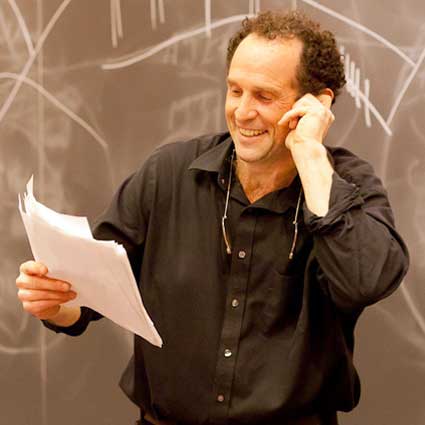Play
by Joshua Sobol
Staged Reading
Israeli Stage
Hibernian Hall
Roxbury, Boston
September 24, 2017
With Jeremiah Kissel

Kol is a lawyer, outrageous, a womanizer, difficult, prone to outbursts, who also has a deep sense of justice. Having fought for Gaby Sheffer, a doctor who came up against overpowering comic forces in his attempt to show up the vulnerabilities of a new drug, Kol is now on the verge of spending a year in jail for contempt, having literally thrown the book at a judge. Meanwhile, on the doorstep of the jail, he is approached by a a woman over the phone who provides evidence that may change the course of the trial that has condemned both him and Sheffer.
This intricate and very interesting play is a tour de force for Jeremiah Kissel who, as the single actor in this energetic drama, brings to life, through literally a series of phone calls, a world of intrigue, corruption, romantic transgression and existential angst. He is just terrific in this role; he gives it his all.
This production is one of Israeli Stage’s staged readings, so Kissel actually has a script in hand while he works his magic, but he works it thoroughly and with conviction nonetheless. It is so vividly done that one might well have attended the reading and not really think that he was taking his lines from a printed script.
Joshua Sobol’s play is engaging and complex, involving a lawsuit and its sequelae, and Kol’s attempt to work his way through a series of relationships – with his wife, his lover and a new found informational support in a law school librarian, to help him find justice in a world gone awry.
In the talkback after the show, an Israeli in the audience pointed out that a corrupt judiciary, which enters into the plot, is not a signficant feature of Israeli life. Nonetheless, in the context of Sobol’s drama, one wonders whether in fact Israeli justice per se, or rather justice in general, is at issue here. The down-to-earthness of the plot which involves drug invention and the capitalisation on that, makes one think the play must apply to a particular, notably Israeli, setting. But, if one knows Sobol’s plays generally, one realizes that his tendency is to meld the political and the metaphysical, to draw elements of absurdity and alienation from political life, but then to abstract them into something quite a bit broader.
Here, clearly, the name Kol – all in Hebrew – signifies a kind of Everyman, so it is likely the play is not dealing so much with particularities of a single lawyer facing injustices, but a condition exemplified by that metaphor to characterize something germane about the human condition. In fact, in the text of the play, Sobol refers to Kafka’s stories and one can only think that he must have the stirring and disturbing Before the Law in mind as a kind of motivating force behind his own improvisations. In Kafka’s story, a man finds himself before the law and he waits and waits and waits to get inside; finally he cannot, having been told in the end that this door was only made for him and now it will be shut.
In the current play, Kol awaits jail, an analogous fate to that of Kafka’s protagonist, and scrambles in the echoes of his life on earth to find some scrap of justice before he enters that ultimate incommunicado confinement. It’s an interesting amalgamation of the absurdist-existential image from Kafka and a more sociopolitical one, but that’s Sobol’s stock in trade.
Sobol’s play is ingenious but it would benefit from some greater clarity about the nature of the lawsuit that entails Sheffer’s being accused and Kol’s defense of him. The ambiguity of that suit feeds a kind of of haziness at the core, which, if cleared up, might give a tighter sense of where the implied injustice lies.
The play is filled with poignant and tragically funny references in Kol’s conversations with his mother, to whom he’s pretending to off to some fictional South American wilderness instead of telling her that he’s going to jail. As well, his interactions with his ex-lover who he’s trying to enlist as an attorney in a new case to be brought against the corrupt forces that have rained down on him and Sheffer, and with his wife who holds all important papers for the case in stoarage and their house and who is royally pissed at Kol for his many inflidelities and transgressions, are both dramatic and hilarious.
By and large the play is written with a series of transitions that make sense but there are a group of flashbacks, mainly to the series of trials, that seem to have forced integrations with the main flow of the narrative. There would be plenty of drama with just the phone calls and the story that they tell. Clarification of the lawsuit at the core of the drama and the removal of those courtroom flashbacks would make for a stronger, tighter drama. As is, this is a fine play, and Kissel really gives an incredible interpretation of it. It will be fascinating to see how it evolves as it makes its way towards a full production.
– BADMan
Leave a Reply